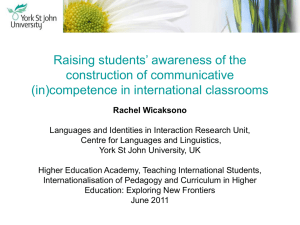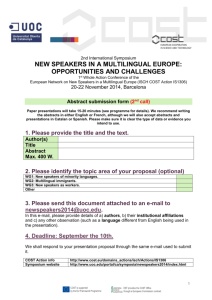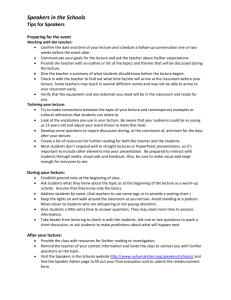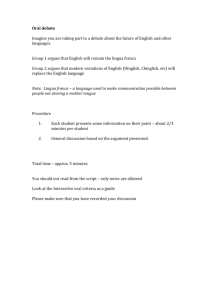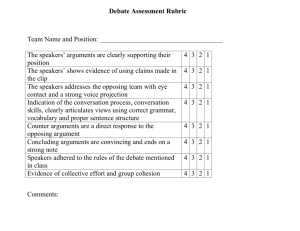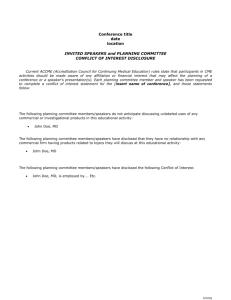Changing Englishes in internationalising universities: increasing the
advertisement
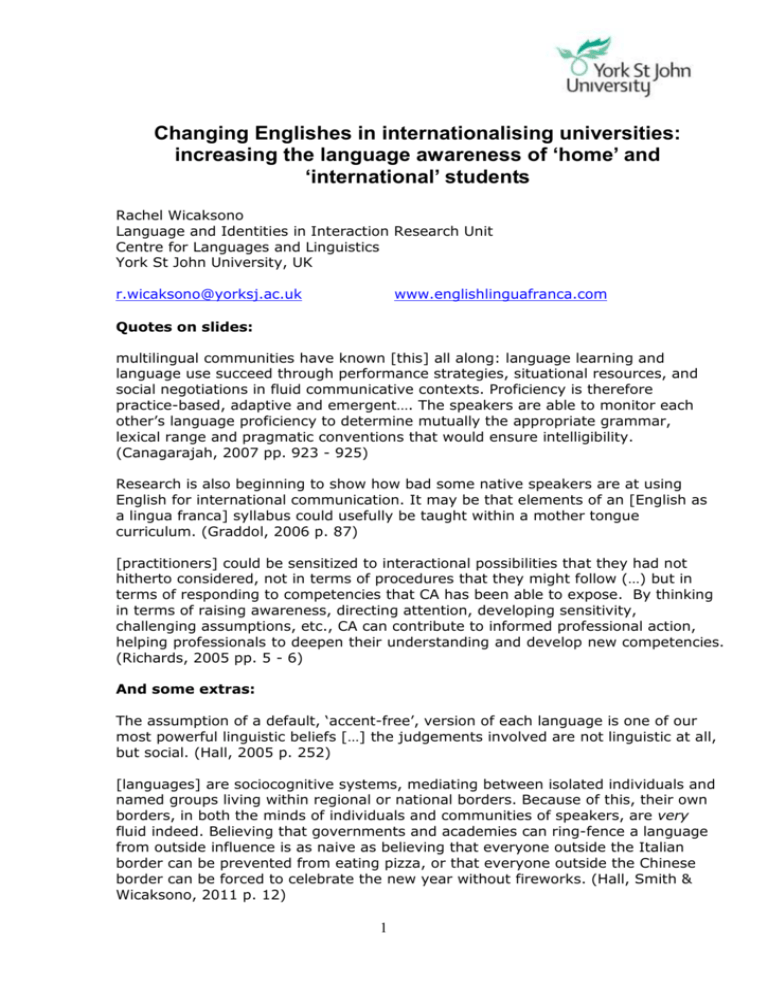
Changing Englishes in internationalising universities: increasing the language awareness of ‘home’ and ‘international’ students Rachel Wicaksono Language and Identities in Interaction Research Unit Centre for Languages and Linguistics York St John University, UK r.wicaksono@yorksj.ac.uk www.englishlinguafranca.com Quotes on slides: multilingual communities have known [this] all along: language learning and language use succeed through performance strategies, situational resources, and social negotiations in fluid communicative contexts. Proficiency is therefore practice-based, adaptive and emergent…. The speakers are able to monitor each other’s language proficiency to determine mutually the appropriate grammar, lexical range and pragmatic conventions that would ensure intelligibility. (Canagarajah, 2007 pp. 923 - 925) Research is also beginning to show how bad some native speakers are at using English for international communication. It may be that elements of an [English as a lingua franca] syllabus could usefully be taught within a mother tongue curriculum. (Graddol, 2006 p. 87) [practitioners] could be sensitized to interactional possibilities that they had not hitherto considered, not in terms of procedures that they might follow (…) but in terms of responding to competencies that CA has been able to expose. By thinking in terms of raising awareness, directing attention, developing sensitivity, challenging assumptions, etc., CA can contribute to informed professional action, helping professionals to deepen their understanding and develop new competencies. (Richards, 2005 pp. 5 - 6) And some extras: The assumption of a default, ‘accent-free’, version of each language is one of our most powerful linguistic beliefs […] the judgements involved are not linguistic at all, but social. (Hall, 2005 p. 252) [languages] are sociocognitive systems, mediating between isolated individuals and named groups living within regional or national borders. Because of this, their own borders, in both the minds of individuals and communities of speakers, are very fluid indeed. Believing that governments and academies can ring-fence a language from outside influence is as naive as believing that everyone outside the Italian border can be prevented from eating pizza, or that everyone outside the Chinese border can be forced to celebrate the new year without fireworks. (Hall, Smith & Wicaksono, 2011 p. 12) 1 The native is no longer a model speaker of WE [….] Communicative competence in WE is in large measure of an interlingual or multilingual nature, and therefore, far from being an asset, being a monolingual may actually turn out to be an encumbrance. Indeed, the day may not be far off when native speakers of English may need to take crash courses in WE, in order to be able to cope with the demands of an increasingly competitive world market. (Rajagopalan, 2004 p. 117) Native as well as non-native English speakers should have assistance in their use of English for international communication because of the different functions of English across cultures. (Smith, 1983 p. vi) Because of the diversity at the heart of this medium, LFE is intersubjectively constructed in each specific context of interaction. The form of English is negotiated by each set of speakers for their purposes. The speakers are able to monitor each other’s language proficiency to determine mutually the appropriate grammar, lexical range and pragmatic conventions that would ensure intelligibility. (Canagarajah, 2007 p. 925) What would facilitate conversation in English as a global language (of the ELF2 variety)? […] Our data seem to show that grammatical forms are negotiated by individuals within ELF processes and are not necessarily shared by all interacting users. This would suggest that the center will not be 'World Standard Spoken English', 'Lingua Franca Core' or the traditional Anglo-American variety of English. It will not be lexicogrammar at all. Rather it will be the negotiation strategies which speakers of all communities bring to the interaction. (Roberts & Canagarajah, 2009 p. 225) Challenging widely held and, potentially beneficial, at least in the short term, ideas about English is a sensitive business and it is tempting to look for the usual 'top tips' such as "be direct" and "be clear". But successful communication is person-, task- and situation-specific, and the only good tip is to put on hold assumptions about what English is and how it really should be used. Of course, this runs counter to the activities of national governments and anyone else who stands to benefit from a monolithic version of what English is. UK universities with an international agenda are in a tricky position here; are we promoting an opportunity to come and be taught where English is 'at its best', an attitude which only hampers successful international communication? Or, are we open to noticing how English is already successfully used around the world in multifarious ways, and to sending a strong signal of our willingness to learn? (Wicaksono, 2012 p. 248-9) 2 References Canagarajah, S. (2007). Lingua franca English, multilingual communities, and language acquisition. Modern Language Journal, 91, 923-939. Graddol, D. (2006). English next. British Council Learning. Available online at: http://www.britishcouncil.org/learning-research-english-next.pdf [last accessed 9/11/11]. Hall, C. J. (2005). An introduction to language and linguistics: Breaking the language spell. London: Continuum. Hall C. J., Smith, P.S, & Wicaksono, R. (2011). Mapping applied linguistics: A guide for students and practitioners. London and New York: Routledge. http://www.mappling.com [last accessed 12/05/12] Rajagopalan, K. (2004). The concept of ‘World English’ and its implications for ELT. ELT Journal, 58/2, 111 – 117. Richards, K. (2005). Introduction. In K. Richards & P. Seedhouse (Eds), Applying Conversation Analysis. Basingstoke, Hampshire: Palgrave Macmillan. Roberts, P. and Canagarajah, S. (2009). Broadening the ELF paradigm: Spoken English in an international encounter. In F. Sharifian (Ed.), English as an international language: Perspectives and pedagogical issues. Clevedon: Multilingual Matters. Smith, L. E. (Ed.) (1983). Readings in English as an international language. Oxford: Pergamon. Wicaksono, R. (2012). Raising students' awareness of the construction of communicative (in)competence in international classrooms. In J. Ryan (Ed.), Crosscultural teaching and learning for home and international students: Internationalisation, pedagogy and curriculum in higher education. London and New York: Routledge. 3 Some notation symbols (.) (.3), (2.6) A: talk talk [talk B: [talk .hh, hh . ? tata:lk A: talk= B: =talk talk, TALK ºtalkº ((LS)) a very short (only just noticeable) pause a timed pause, in seconds square brackets aligned across adjacent lines denote the start of overlapping talk. Some transcribers also use "]" brackets to show where the overlap stops in-breath (note the preceding full stop) and outbreath respectively gradually falling intonation to the point at which the full stop symbol is used gradually rising intonation to the point at which the question mark symbol is used, not necessarily an actual question dash shows a sharp cut-off colons show that the speaker has stretched the preceding sound an equals sign shows that there is no noticeable pause between two speakers' turns underlined sounds are louder, capitals louder still material between "degree signs" is quiet lip smack 4 Data Extract 1: With Rachel 01 O: 02 What- what parts of ummm like your lessons (.) have you enjoyed (.) doing (.) with Rachel. 03 S: (2.0) Hmm? 04 O: What parts of your ermmm ((LS)) (1.0) foundation programme 05 have you enjoyed doing with Rachel. 06 S: (.) We- I don’t have Rachel. 07 O: Oh you do:n’t? oh right. So what- (1.0) what lessons d- 08 what lessons are you doin’? Extract 2: It depends 01 C: (.h) err (1.9) which do you feel is most important when you learn 02 English th- the writing and understanding of the language 03 or the speaking and pronunciation which do you find (.h) you 04 should (.) you: should err (.) err work more active? err (.) to 05 be emm (1.2) so to grammatically understand the language or 06 err (.) just so you can speak and get by the pronunciation which 07 do you think is most important? 08 M: en it depends on situation I think= Extract 3: What have you done? 01 B: So whilst you’ve been learning English what kind of things have 02 you covered already (.) what kind of areas have you covered whilst 03 you’ve been here. 04 G: (.) What do you mean? 05 B: (.)(.h) Well, have you looked at (.) erm (.) travelling and directions 06 °have you looked at° °°how to you know like how to°° °catch the bus. 07 like in the supermarket° like buying and selling [food?] 08 G: [yeah ] 5 English as a lingua franca in the classroom: some questions Read your transcript and make brief notes on question A and on one, several or all questions B to E, depending on what your group agreed. If there is anything else interesting in the transcript of your discussion, go ahead and make a note of it! A: What is the main aim of the discussion? Who decided that this is the aim? Does the recording show that that everyone agreed with this aim? How do the people in the discussion show that they agree or disagree with this aim? In addition to what people say, try to listen for how they say it; for example, do they put stronger stress on some words, does their intonation rise or fall, do they speak louder or more softly and so on? In the discussion, B: Does anyone misunderstand what another person is saying? How do they show that they have misunderstood? What is the reaction of the misunderstood speaker? Is the misunderstanding sorted out? How? Who sorts the misunderstanding out? What is the effect of any misunderstanding on the group’s achievement of its aims? C: Does anyone disagree with what another person is saying or how they are saying it? How do they do this? What is the reaction of the corrected speaker? Is the disagreement sorted out? How? Who sorts the disagreement out? What is the effect of any disagreement on the group’s achievement of its aims? D: Does everyone have an equal opportunity to speak? Does anyone interrupt another speaker? How do they interrupt? What is the reaction of the other speakers to the interruption? What is the effect of the distribution of opportunity to speak on the group’s achievement of its aims? E: Does anyone: laugh; sigh; hesitate; repeat (maybe using slightly different words) an opinion or question several times; repeat (maybe using slightly different words) another person’s opinion; use slang, idioms or taboo language; mix different languages? How? What is the effect of any of these features on the group’s achievement of its aims? 6
